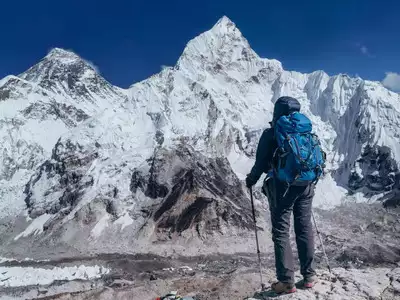
For some, spending long arduous days walking and climbing the rugged terrains and summiting peaks is a way to recharge themselves. For them, vacationing is not walking across the golden sands of a beach, rather it is undertaking the adventurous sport of trekking. Let’s read up on trekking, a sport that can be your stepping stone to its advanced, adventurous version of sport called mountaineering.
It is probably here that it all began. At the summit of the world’s tallest mountain- the 29,031 ft tall Mt. Everest.
Edmund Hillary and Sherpa Tenzing Norgay reached the summit of Everest in 1953. Although Everest was attempted before, the duo became the first to stand at the crest of the world’s highest mountain. And in no time, the rush to ascend the peak started and continues till date.
If we sift through the pages of history, the first recorded hike was undertaken during the second century. Roman Emperor Hadrian, ascended Mt. Etna to see the sunrise from its summit. Even now, Mt. Etna is a favoured trekking spot among the trekking community.
For some, climbing mountains, spending long arduous days walking and climbing the rugged terrains, is a way to recharge themselves. For them, vacationing is not walking across the golden sands of a beach, rather it boils down to an adventurous climb on a mountain. We call the adventurous sport trekking. How about learning more about trekking?
Trekking
The thrill to trek and summit the mountains evolved into the adventurous sport we call trekking. Trekking can be defined as walking for several days or weeks on a multitude of terrains, all the while carrying your “world” of essentials with you in your rucksack. You end the day by camping at dusk at camping sites.
How to start
One can get initiated into trekking with hikes. Hikes are small walks undertaken in nature that last a day. At the end of the day, you return to the place when you started the hike. Once you build up your physical strength, you can undertake small treks that last two days or more. As you get better at it, you can change your goals and start eyeing higher perks. Always choose a reputed trekking or adventure club for your treks. Alternatively, you can join the neighbourhood trekking or adventure clubs to embark on hikes or treks. Further, many mountaineering/adventure institutes in India offer courses on the sport. For someone who is serious about climbing, this can be a good place to start with. The trekking seasons will vary depending on the kind of trek you want to undertake. Jammu and Kashmir (Ladakh, Zanskar). Himachal Pradesh, Uttarakhand, Sikkim and Darjeeling, Northeast states, the Western Ghats and the Nilgiris are some of the popular regions in India where you can trek.
Gear and physical fitness
For a trekker, the trekking gear is everything. It is something that should never be compromised. Because on the mountains, your gear becomes your lifeline.
Equipping oneself with the proper gear viz. shoes, gloves, right bag, climbing equipment, and so on will make one’s trek safe and easy. The trekker also has to be self-sufficient and should be able to carry the essentials in their bag. It goes without saying that one needs to be extremely fit to climb.
Challenges
Like any adventure activity, trekking also has its own challenges. Weather can change unexpectedly as you climb up the mountains Altitude sickness, dehydration and sunburn are the other emergencies one can come across. A bad footing can be very risky and so is any encounter with wild animals. Following the advice of the trek leader and keeping to the trek trail will help avoid unnecessary problems Lear about the weather conditions before embarking on the trek and prepare yourself accordingly. One of the cardinal rules is to start early to arrive early at the camping site
Why trek
And why do we climb? Why do countless trekkers put themselves through this arduous and painful experience of braving difficult terrains and climates to scale a mountain? Ask any trekker, and the answer will never be the same. But one thing is agreed upon. Trekking helps one disconnect from the outside world and connect with nature and oneself. In fact, it is a journey one undertakes inwards. Be it the indigenous communities you encounter on your trail to the flora and fauna, everything leaves its mark on you. When you come back after a trek, you wouldn’t have just climbed a mountain, but you would have learnt many lessons. The mountains humble you and instill in you a new appreciation of the world and its ways. So are you stoked enough to give trekking a try?
Picture Credit : Google

